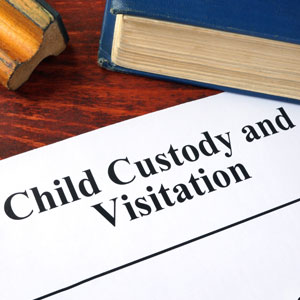Divorce is never simple for any family – but is twice as complicated when there are children involved. This article briefly covers the essentials of custody and visitation in Maryland, as well as a number of other frequently asked questions about the process, including subjects like…

If you are in the middle of the divorce proceedings, and you and your spouse cannot agree on who should have custody of your children, the court may request a “pendente lite” hearing. These “PL” hearings have the goal of determining where the children should stay by seeking to discover what is in their best interest.
PL hearings usually happen early in the litigation process. During them, the judge will listen to both parties and take in evidence as to the fitness of parenthood of both spouses. They will then, based on what is in the best interest of the children involved, determine at least temporary custody. On rare occasions, you might even get a consent order permanent custody decision during that period.
By Maryland law, final custody is ultimately determined solely on the basis of what is in the best interest of the child or children. However, that is often up for debate, as there are a lot of factors that can be brought up to push or pull that decision one way or another.
In fact, there are several court cases that have dove extensively into that area of the law. This means you, and more importantly, your attorney, may have a substantial impact on that decision if you know what to focus on and bring up.
If you have gone through a divorce or separation already and failed to obtain custody of your children, you will need to work out a system and schedule for visitation so that you can see them regularly. Such a visitation arrangement can either be worked out by both parents amicably, or it can be decided on by the court.
This can be anywhere from no relationship at all, to split physical custody where the child spends half their time with each parent. The outcome ultimately depends upon either what can be agreed upon by the parents or what the court thinks is in the best interest of the children.
If no agreement seems possible, you can try mediation as a less arbitrary and more cooperative alternative to trial. Unfortunately, if no amicable agreement can be reached, then there will need to be a trial, and the court will decide on the issue(s) in question. If you do not yet have an attorney, you will certainly want one who can help you protect the best interests of yourself and your children during the trial process.
Even if you go to court for a decision about your children, it is highly unlikely they will be asked to testify, even less likely in court.
If they are young, the court will typically not want to hear their testimony or get them involved in any way. In extreme situations, the court might appoint an ad litem guardian to gather evidence on behalf of the child and testify.
If your children are closer to the age of 18, in certain cases, it may be appropriate to have them testify in court, though this practice is still generally avoided as much as possible.
Under the current laws of Maryland, children do not have a say in who they will live with.
It can be quite emotionally difficult, both for you and your children, to not see each other often enough. If you are unsatisfied with your current visitation arrangements, you can try re-negotiating a visitation agreement with your ex.
The only other alternative is petitioning the court to consider a modification or a new custody order that allows a more frequent visitation schedule. This will either require new evidence or a change in circumstances, though a strong attorney will be able to help you identify the arguments most likely to win over the Maryland courts. For more information on Child Custody And Visitation In A Maryland Divorce, an initial consultation is your next best step.

Call Now At (443) 929-0448